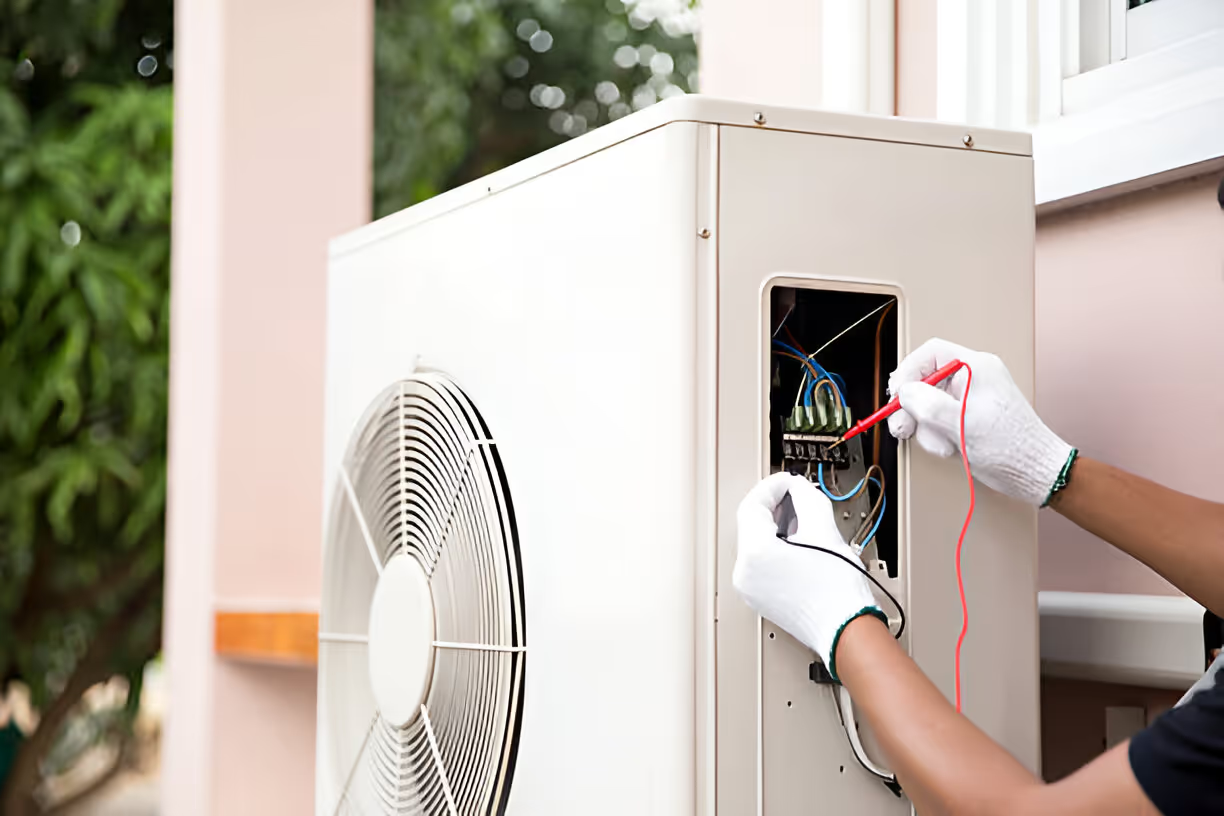Heat Pump Tune Up in Terryville, NY
A professional heat pump tune up in Terryville, NY keeps your system running reliably through hot, humid Long Island summers and the cold snaps of winter. Regular maintenance prevents breakdowns during peak demand, restores efficiency lost to coastal humidity and seasonal dust, and extends the life of costly components.

Why a tune up matters for Terryville homes
Terryville’s climate puts specific stresses on heat pump systems: humid summers encourage coil fouling and higher cooling loads; winters with freezing nights can trigger icing and more frequent defrost cycles; and proximity to coastal air increases the risk of corrosion on outdoor coils and fasteners. A tune up addresses these local challenges by optimizing refrigerant charge, improving airflow, and ensuring controls and safety devices work correctly before problems escalate.
Common heat pump problems in Terryville, NY
- Reduced heating capacity during cold snaps or diminished cooling on humid summer days
- Outdoor unit iced over or excessive frost buildup in winter
- Short cycling (system turns on and off frequently) leading to wear and higher energy use
- Unusual noises from the compressor, fan motor, or loose panels
- Low airflow caused by clogged filters, dirty coils, or blocked vents
- Refrigerant leaks and improper pressure readings reducing efficiency
- Electrical issues: worn capacitors, failing contactors, or loose wiring
- Thermostat miscalibration or communication problems between thermostat and system
- Corrosion and motor wear from salty/marine-influenced air
What a heat pump tune up includes
A comprehensive tune up is a methodical inspection and service to diagnose, clean, adjust, and optimize the entire system. Typical components of the appointment include:
- Visual and operational inspection
- Verify model, age, and run history; inspect for corrosion, oil stains, or rodent damage
- Run the system through heating and cooling cycles to observe performance
- Cleaning and airflow work
- Clean or advise replacement of air filters
- Clean outdoor coil fins and indoor evaporator coil if accessible
- Clear debris around outdoor unit, confirm proper clearance, and straighten fins for airflow
- Refrigerant and pressure checks
- Measure refrigerant pressures and subcooling/superheat to confirm correct charge
- Look for signs of refrigerant leaks and recommend repair if needed
- Electrical and safety inspection
- Tighten electrical connections, inspect contactors and relays, test capacitors and motors
- Test safety controls, reversing valve operation, defrost cycle, and high/low pressure cutouts
- Mechanical adjustments and lubrication
- Lubricate fan motors and bearings where applicable
- Check and adjust belt tension on older designs
- Controls and thermostat calibration
- Verify thermostat setpoints, sensor function, and correct staging
- Confirm system response to thermostat commands and zoning controls if present
- Performance optimization and documentation
- Record temperature splits, airflow readings, amperage draws, and static pressure where applicable
- Provide recommendations for parts repair or replacement and expected maintenance schedule
Typical duration and what to expect during the appointment
Most tune ups for a single heat pump system take approximately 60 to 90 minutes when no major repairs are required. Systems with significant build-up, multi-zone ductwork, or older equipment can take longer. The technician will perform tests during active heating and cooling cycles, so expect short periods of system operation during the visit. A written checklist of items inspected and measured is commonly provided at the end of the service.
How often to schedule a tune up
- Standard recommendation: at least once per year for routine maintenance.
- Best practice for dual-use heat pumps (heating in winter and cooling in summer): twice per year — once before the cooling season and once before the heating season.
- Older systems or units located in high-corrosion areas may benefit from more frequent checks.
Regular seasonal tune ups reduce the chance of emergency repairs, maintain efficient operation, and keep warranty requirements satisfied for many manufacturers.
Common repairs identified during tune ups and why they matter
- Refrigerant top-off or leak repair: Low charge reduces capacity and raises compressor stress. Detecting leaks early prevents extensive component damage.
- Capacitor or contactor replacement: These electrical components fail with age and can cause no-start conditions or poor compressor performance. Replacing worn parts restores reliable starts and efficiency.
- Motor or fan repair: Worn bearings or bent blades reduce airflow and increase energy use; addressing these problems improves system balance.
- Defrost control repair: A malfunctioning defrost cycle leads to ice build-up and lost heating capacity in winter. Fixing the control restores normal operation.
- Coil cleaning or replacement: Dirty coils limit heat transfer; cleaning improves efficiency and can reduce runtime by restoring normal temperature differentials.
Technicians prioritize safety and reliable operation; if a repair is recommended, the service appointment will document symptoms, test results, and the likely next steps with clear reasoning.
Seasonal and homeowner maintenance tips
- Replace or clean filters every 1–3 months depending on household conditions such as pets or smokers.
- Keep the outdoor unit free of vegetation, leaves, and stored items; maintain at least 2 feet of clearance.
- Ensure ducts and supply registers are open and unobstructed; sealed ducts improve performance.
- Program or upgrade thermostats to maintain steady schedules and reduce short-cycling; consider smart thermostats that learn patterns and reduce runtime.
- Watch for early warning signs: reduced airflow, strange noises, or persistent cycling — addressing these early prevents larger failures.
Benefits of routine tune ups
- Improved energy efficiency and lower utility bills through optimized refrigerant charge and airflow
- Increased reliability and fewer emergency breakdowns during peak seasons
- Extended equipment lifespan by reducing component stress and wear
- Better indoor comfort with more consistent temperatures and humidity control
- Reduced repair costs over time by catching issues early
A heat pump tune up in Terryville, NY is a preventative investment that aligns with regional needs—combating humid summers, shielding equipment from coastal-related corrosion, and ensuring dependable heating during winter. Regular maintenance keeps your system efficient, safe, and ready for the seasonal demands of Long Island living.
Customer Testimonials
Hear directly from homeowners who trust Bobby O’s HVAC Inc. for fast response times, honest service, and lasting comfort.











